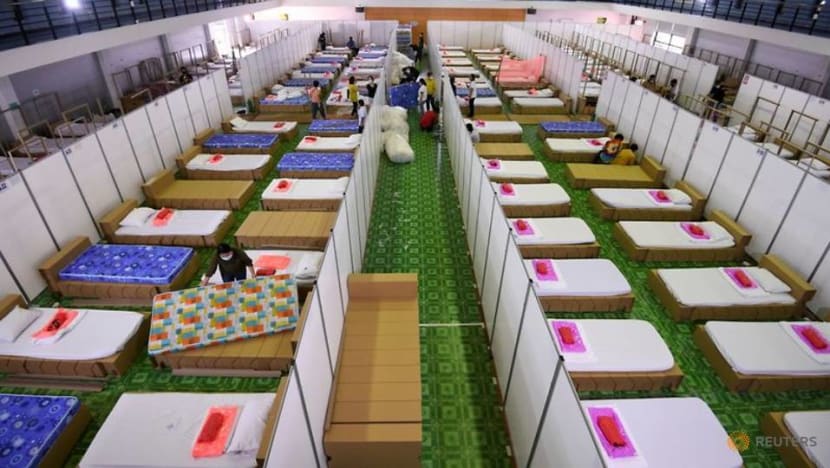Thailand faces 'tight situation' for hospital beds, those with many COVID-19 symptoms to get priority

In this Apr 12, 2021, file photo, healthcare workers in Bangkok prepare beds inside a field hospital recently set up to fight the spread of COVID-19 as Thailand deals with a fresh wave of infections after tackling earlier outbreaks. (File photo: Reuters/Chalinee Thirasupa)
BANGKOK: A shortage of hospital beds in Thailand has put a strain on its public health system as a new wave of COVID-19 infected more than 34,000 patients this month.
On Thursday (Apr 29), the Centre for COVID-19 Situation Administration (CCSA) reported 1,871 new cases and 10 more deaths. Although the daily case number went below 2,000 for the first time in six days, hospitals are increasingly filled with patients with severe conditions.
Data from the Public Health Ministry showed a gradual increase in patients with intubation needs and those who suffer pneumonitis or inflammation of lung tissues, which could lead to respiratory failure and death. The number of such patients exceeded 700 on Thursday.
The continued increase of infections has led to the opening of several field hospitals and hotel hospitals nationwide, where more than 10,000 beds remain available.
However, these facilities can only accommodate asymptomatic patients and those with mild symptoms. For those with moderate symptoms or severe conditions, they need to be treated at regular hospitals.
READ: Thai PM granted sweeping powers to curb COVID-19
According to the Department of Medical Services, there are 44,560 hospital beds across Thailand. As of Apr 27, 22,865 beds were available.
But more than half of these were located at field hospitals and hotel hospitals, while a large number of beds in regular hospitals were taken.
“Airborne infection isolation rooms (AIIR) are most equipped for patients with severe conditions who require intubation. Modified AIIRs, which are secondary, can also accommodate those with severe conditions. These two types of rooms are already 70 per cent to 80 per cent (occupied),” deputy director of the Medical Services Department Nattapong Wongwiwat said at a press conference on Tuesday.
“So, frankly speaking, we have come to a tight situation where we don’t have much space left for new patients unless it is well managed. We can’t admit 100 per cent of the patients and this is why we need to manage it by reserving the beds.”
According to Nattapong, it is important to gradually remove patients from airborne infection isolation rooms and intensive care units once they have recovered in order to make space for those in need. At the same time, he noted, Thailand also needs more such rooms in both private and public hospitals.
“Airborne infection isolation rooms are still available in private hospitals but for any patient to be admitted there, it depends on the doctor’s diagnosis,” Nattapong said.
“Patients who exhibit many symptoms will be taken in first. As for patients whose symptoms show they can wait, the system will gradually handle them. The same applies to private hospitals,” he added.
READ: With few travellers, Thailand turns Suvarnabhumi airport into COVID-19 vaccination centre
"MAINTAIN HOSPITAL BEDS FOR THOSE IN NEED”
As the need for hospital beds grows, public attention has been drawn to Thailand’s health system amid reports of bed shortage and consequential deaths of COVID-19 patients.
Last week, an 85-year-old woman died at her house in Bangkok while waiting for a hospital bed.
Her case captured public attention when a TikTok video went viral, showing three elderly women stuck in their own home after testing positive for the coronavirus. The 85-year-old was in a critical condition. She was shown lying on the floor behind her two sisters, aged 70 and 75.
“To any unit, please come here quickly and take her. My sister is dying and hasn’t eaten for days. She has been asleep since last night and would not wake up. Normally, she’d get up to have coffee in the morning,” one of her sisters said in a plea in the video.
The clip was posted on Apr 13 before it went viral. Nine days later, the elderly woman in a critical condition was reported to have died at home while waiting for help.
According to the family’s relative, who posted on social media asking for medical help, the family had tried to contact health workers through “every channel” but no ambulance was sent to pick them up.
“Everybody is sorry and has tried their best to solve the problem. But even doing their best is not enough,” Anutin Charnvirakul told reporters after learning about the elderly woman’s death.
READ: Thai finance ministry slashes GDP outlook over COVID-19 return
Her case is one of several others where the infected have been unable to secure hospital beds or get in touch with medical personnel through COVID-19 hotlines. According to CCSA assistant spokesperson Apisamai Srirangsan, the government and relevant units are aware of the situation and are working to resolve it.
“I’d like to stress all the units that provide services have already been trying to discuss, coordinate and come to a conclusion on a daily basis in order to bring these people into the monitoring system and healthcare, as well as provide them with beds so they are safe,” she said in a briefing at the Government House on Wednesday.
“Each day, we know there are patients who wait for the beds and management that would enable them to receive the right treatments. But at the same time, we continue to have new patients and their number is growing dramatically.”
Data from the Public Health Ministry showed a jump in the daily case numbers from 194 cases on Apr 5 to 2,070 cases on Apr 23. The daily case numbers had remained higher than 2,000 until Thursday.
“Some hospitals reported that 25 per cent to 50 per cent of their patients are those with severe conditions who need intubation,” Apisamai said.
“That’s why from time to time, there are requests for patients who don’t exhibit severe conditions to go to field hospitals or hotel hospitals. This is the reason why we need to maintain hospital beds for those in need."
READ: Thai prime minister fined for not wearing face mask in public amid new wave of COVID-19
PARTS OF THAILAND TO TURN "DARK RED" IN MAY
Last year, Thailand managed to contain the spread of COVID-19, and reported relatively low numbers of infections and casualties compared to other countries.
But the situation changed in 2021. As the country geared towards reopening some areas for tourism, it was hit by a new wave of outbreaks that spread from nightclubs, parties and restaurants.
Tens of thousands of infections have spread nationwide since early April, along with reports of the UK strain of the coronavirus, which can spread 1.7 times faster than the "wild type" strain found previously in Thailand.
To slow down the spread, CCSA announced a proposed new category of zoning called “maximum and strict controlled area” on Thursday. The new classification is expected to take effect on May 1 and include six provinces, namely Bangkok, Chonburi, Chiang Mai, Nonthaburi, Pathum Thani and Samut Prakarn.
READ: Bangkok could be declared COVID-19 red zone ahead of Thai water festival
Bangkok has reported 11,588 cases since April, making it the most infected province in Thailand. According to CCSA spokesperson Taweesin Wisanuyothin, residents in the six so-called “dark red zones” are expected to face more restrictions come Saturday. These include bans on dining-in at eateries and events with more than 20 people.
“Businesses selling food and drinks can only do takeaways,” he said in a briefing at the Government House on Thursday. “No consumption of food, drinks, alcohol or alcoholic drinks will be allowed at the eateries, which will be able to operate until 9 pm.”
Indoor sports venues, gyms and fitness centres will once again face temporary closures while department stores and community malls can stay open until 9 pm, according to Taweesin.
“People living in the maximum and strict controlled areas are to avoid travelling outside the area unless necessary, in order to reduce trips that could risk infection,” he said, adding this is not a curfew but a request for cooperation.
Editor's note: An earlier version of this story said that there were more than 1,000 patients with intubation needs and suffering from pneumonitis or inflammation of lung tissue on Apr 29. That is incorrect. There were more than 700 such patients. We apologise for the error.
BOOKMARK THIS: Our comprehensive coverage of the coronavirus outbreak and its developments
Download our app or subscribe to our Telegram channel for the latest updates on the coronavirus outbreak: https://cna.asia/telegram












